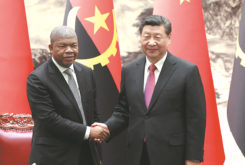The Portuguese-speaking countries (PSCs) will play a key role in the future of Macau outlined in the Greater Bay Area (GBA) Plan of the Central Government of China.
The GBA consists of the two SARs — Macau and Hong Kong — and nine cities in Guangdong – Guangzhou, Shenzhen, Foshan, Dongguan, Zhaoqing, Jiangmen, Zhongshan, Zhuhai and Huizhou. Its GDP in 2017 was US$1.5 trillion. It is the most developed area of China, with the highest levels of foreign investment and per capital incomes.
The Plan was unveiled last week. Together with Hong Kong, Shenzhen and Guangzhou, Macau is one of four “key cities” and “core engines for regional development”. The Plan designates Macao as a tourism hub and platform for trade with the PSCs.
One important role is in tourism. Macau should establish a training base for bilingual talent proficient in Chinese and Portuguese and help the tourism industry, the Plan says.
Macau should leverage its distinctive characteristics as a place where diverse cultures from both East and West have long integrated and co-existed, expedite the development of cultural industries and cultural tourism and develop a cultural exchange centre between China and the Lusophone countries.
Another area of cooperation is trade and financial services. In detail, it said that Macau should study the feasibility of establishing a platform for Sino-PSC financial services. “Macau should develop into a world-class tourism and leisure centre and a commerce and trade cooperation service between China and the PSCs, promote an appropriate level of diversified economic development.”
Macau should also serve as an entry point for the PSCs into the mainland market. The SAR should expedite the development of a food trading and distribution hub for PSCs.
One important place for this is Hengqin, which is part of the neighbouring city of Zhuhai that is closest to Macau. Beijing has designated it as a special area, with preferential policies not available in other cities.
“Hengqin and Macau should jointly develop the China-Latin America economic and trade cooperation platform, establish international trade channels between the Mainland and Belt and Road-related countries and region. It should promote innovation in modes of trade, such as cross-boundary supply, overseas spending, movement of natural persons and commercial presence.
“Hengqin should provide a pivot for Macau’s development of cross-boundary e-commerce industries and facilitate the convenient entry of products from PSCs into the Mainland market via Macau. Under study is a proposal to give authority to Hengqin to issue residence permits to foreigners.”
Students from PSC countries are an important part of higher education in Macau. The aim is to turn the GBA into an international demonstration zone for education, bring in world-renowned universities and specialised colleges and pursue the establishment of world-class universities and academic programmes. The Plan wants to attract students from all over the world, including the PSCs. Universities in Macau offer them the additional benefit of being able to take courses in Portuguese.
Finance is another sector for cooperation between Macau and the PSCs. Antonio Trindade, chief executive officer of CESL Asia, Investments and Services, said that the Plan put a clear emphasis on the efforts for the development of key areas of professional and service excellence to serve the development of the GBA, with Macau the regional platform for the PSCs. These sectors include finance, engineers, technology, health care and legal services.
The Plan says: “Leverage the strength of Macau’s ties with the PSCs, capitalise on the Commercial and Trade Cooperation Service Platform between China and the PSCs, ensure the success of the Forum for Economic and Trade Cooperation between China and PSCs, better leverage the functions of the China-PSC Cooperation and Development Fund, provide professional services in areas such as finance and law as well as promote technology exchanges between Mainland and Hong Kong enterprises and Lusophone countries and jointly tap the market in Lusophone countries and other regions.”
Trindade said that the Plan must mean that the future development of Macau should be based on the platform for the cooperation between China, the GBA and the PSCs.
He said that the whole plan was important for the long-term development of Macau, as its role was well established even before the plan was adopted. (CLBrief)



